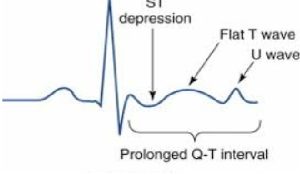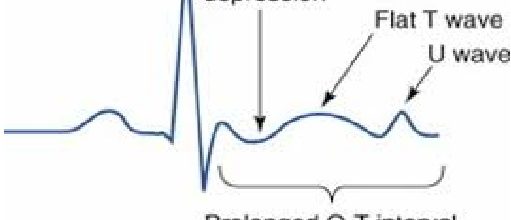Hypokalemia in ECG
Hypokalemia, or low blood potassium, is a condition where the amount of potassium in your blood is lower than normal. It’s a common electrolyte disturbance that can be life-threatening if left untreated.

Electrocardiogram (ECG) changes associated with hypokalemia includes
Flattened T waves
A decrease in the amplitude of the T wave is the earliest ECG change.
ST depression and T inversion
A depression of the ST segment, which appears as an atypically low ST segment below the baseline.
Prominent U waves
A prominent U wave, which is a positive deflection after the T wave. U waves are often best seen in the mid-precordial leads (V2 and V3).
P wave
An increase in the amplitude of the P wave.
PR interval: A prolongation of the PR interval.
QT interval
A prolongation of the QT interval.
Hypokalemia can also cause arrhythmias such as premature ventricular contractions, ventricular fibrillation, atrial fibrillation, and torsade de pointes.
A healthcare provider can diagnose hypokalemia through a blood test. The normal potassium level for an adult is 3.5 to 5.2 milliequivalents per liter (mEq/L). Potassium levels between 3 and 3.5 mEq/L are considered mild hypokalemia.
Treatment
Hypokalemia involves potassium supplementation and identifying and treating the underlying cause.
medlight2u.com
Acne Acne vulgaris Acute Renal Failure Adrenal cortex Angina Angina Pectoris Aortic Regurgitation (AR) Aortic Stenosis (AS) Chest pain Chronic pyelonephritis Coarctation of Aorta Cough cyanosis Cystic acne Dehydration depression Diabetes Mellitus Diagnosis of Aortic Stenosis Dr.KTS DR K TAMILSELVAN Fatigue Heart Failure Hypertension Hypokalemia Hypothyroidism Ischemic Heart Disease LBBB Mitral Incompetence Mitral insufficiency Mitral valve prolapse Nocturia Patent Ductus Arteriosus PDA Polyuria Proteinuria pulmonary hypertension Pulmonary Stenosis ST Depression Symptoms of Acne Syncope Treatment for acne valvular heart disease Ventricular Septal Defect VSD Zits


Leave a Reply